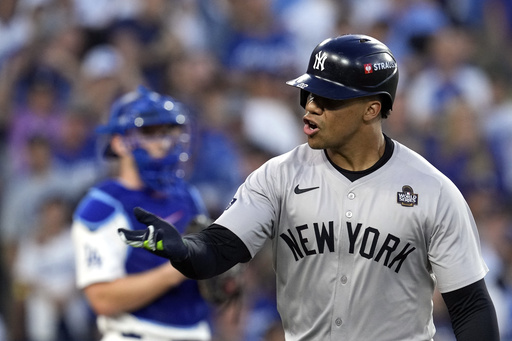NEW YORK — The debate over whether Juan Soto should be compensated more than Shohei Ohtani for the biggest contract in baseball history hinges largely on the structure of deferred payments in Ohtani’s recent agreement.
Ohtani signed a massive 10-year, $700 million contract with the Los Angeles Dodgers last December, which significantly outshines the previous record held by Mike Trout and the Los Angeles Angels, who had a 12-year deal worth $426.5 million that runs through 2030.
A substantial portion of Ohtani’s contract—$680 million—is deferred to be paid between 2034 and 2043. This deferred compensation can be evaluated in several ways:
1. For the luxury tax calculations in baseball, the average annual value of Ohtani’s contract is estimated to be $46.08 million, using a 4.33% discount rate.
2. The players’ association calculates the value at $43.75 million annually, employing a 5% discount rate.
3. In contrast, Major League Baseball (MLB) uses a 10% rate for standard payroll evaluation, which lowers the annual value to $28.21 million.
Soto, looking at a potential contract worth between $600 million and $900 million spread across 10 to 15 years, appears to be in a strong position.
His agent, Scott Boras, has reservations regarding deferred payments and believes teams might be more inclined to offer immediate compensation. “Deferral as a mechanism for me is: Will it impede my ability to get the greatest asset I can acquire? And the answer to that is I don’t think they will want to do anything that impedes their primary pursuit and goal,” Boras explained.
The discount figure used for luxury tax computations is set by the collective bargaining agreement according to the federal mid-term rate specified in section 1274(d) of the Internal Revenue Code for the October before the contract year begins.
With this offseason seeing that rate fall to 3.7%, had Ohtani’s agreement been finalized this month, its annual luxury tax cost would have jumped to around $49.3 million. This shift would have led to an additional tax burden of $3.5 million for the Dodgers, who are expected to surpass the top luxury tax threshold and would incur a 110% tax rate on each exceeding dollar.
MLB’s payroll calculations also employ a similar methodology, basing their figures on the prime rate established by J.P. Morgan Chase as of November 1 previous to the agreement, plus an additional 1%, rounded to the nearest percentage point. For this offseason, that prime rate is set at 9%.
Deferred payments must be funded by July 1 of the second year following the season the money is earned, and these amounts are discounted to present value using a 5% rate.
The Dodgers currently owe over $1 billion in deferred payments scheduled between 2028 and 2046 to several players, including Ohtani, Mookie Betts, Freddie Freeman, and others. “It’s just trying to kick dollars down the road,” remarked John Mozeliak, president of baseball operations for the St. Louis Cardinals, during recent general managers’ meetings.
Two-thirds of this deferred amount pertains to Ohtani’s contract. David Stearns, president of baseball operations for the New York Mets, noted, “It was a unique situation for where a club was, and a unique situation for a player who has very significant earning potential outside of strictly his compensation from a club. Each organization will have a slightly different view on how they approach and calculate the returns on that deferred compensation.”
Andrew Friedman, president of baseball operations for the Dodgers, expressed confidence in his team’s management’s skills to handle deferred payments wisely, highlighting that many owners come from financial backgrounds.
During collective bargaining discussions on June 21, 2021, MLB proposed to eliminate deferred compensation practices altogether. A proposal read, “For contracts entered into after the effective date of the Basic Agreement, deferred compensation of any kind will not be permitted.” However, this suggestion was turned down by the players’ union and not included in the five-year agreement set to expire in December 2026.
New York Yankees general manager Brian Cashman shared that the team’s considerable resources might drive players to seek immediate compensation instead of deferrals. “We’re open to deferrals,” he said. “But players might be more hesitant to accept deferred payments with us than with other teams. However, if we can implement arrangements that benefit us, we will certainly consider them.”
Copyright @2024 | USLive | Terms of Service | Privacy Policy | CA Notice of Collection | [privacy-do-not-sell-link]



